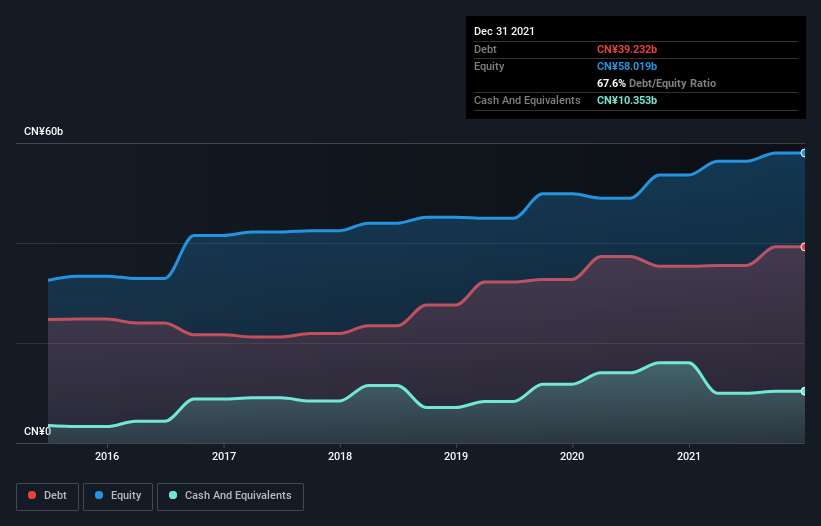Howard Marks put it nicely when he said that, rather than worrying about share price volatility, 'The possibility of permanent loss is the risk I worry about... and every practical investor I know worries about.' So it seems the smart money knows that debt - which is usually involved in bankruptcies - is a very important factor, when you assess how risky a company is. Importantly, Joy City Property Limited (HKG:207) does carry debt. But should shareholders be worried about its use of debt?
When Is Debt A Problem?
Generally speaking, debt only becomes a real problem when a company can't easily pay it off, either by raising capital or with its own cash flow. Part and parcel of capitalism is the process of 'creative destruction' where failed businesses are mercilessly liquidated by their bankers. However, a more common (but still painful) scenario is that it has to raise new equity capital at a low price, thus permanently diluting shareholders. Of course, debt can be an important tool in businesses, particularly capital heavy businesses. When we think about a company's use of debt, we first look at cash and debt together.
View our latest analysis for Joy City Property
What Is Joy City Property's Net Debt?
The image below, which you can click on for greater detail, shows that at December 2021 Joy City Property had debt of CN¥39.2b, up from CN¥35.3b in one year. However, because it has a cash reserve of CN¥10.4b, its net debt is less, at about CN¥28.9b.

How Healthy Is Joy City Property's Balance Sheet?
We can see from the most recent balance sheet that Joy City Property had liabilities of CN¥41.5b falling due within a year, and liabilities of CN¥31.5b due beyond that. Offsetting these obligations, it had cash of CN¥10.4b as well as receivables valued at CN¥3.20b due within 12 months. So its liabilities outweigh the sum of its cash and (near-term) receivables by CN¥59.4b.
This deficit casts a shadow over the CN¥3.64b company, like a colossus towering over mere mortals. So we definitely think shareholders need to watch this one closely. After all, Joy City Property would likely require a major re-capitalisation if it had to pay its creditors today.
We measure a company's debt load relative to its earnings power by looking at its net debt divided by its earnings before interest, tax, depreciation, and amortization (EBITDA) and by calculating how easily its earnings before interest and tax (EBIT) cover its interest expense (interest cover). Thus we consider debt relative to earnings both with and without depreciation and amortization expenses.
With a net debt to EBITDA ratio of 8.9, it's fair to say Joy City Property does have a significant amount of debt. But the good news is that it boasts fairly comforting interest cover of 5.1 times, suggesting it can responsibly service its obligations. Shareholders should be aware that Joy City Property's EBIT was down 23% last year. If that decline continues then paying off debt will be harder than selling foie gras at a vegan convention. When analysing debt levels, the balance sheet is the obvious place to start. But ultimately the future profitability of the business will decide if Joy City Property can strengthen its balance sheet over time. So if you're focused on the future you can check out this free report showing analyst profit forecasts.
Finally, while the tax-man may adore accounting profits, lenders only accept cold hard cash. So the logical step is to look at the proportion of that EBIT that is matched by actual free cash flow. Looking at the most recent three years, Joy City Property recorded free cash flow of 29% of its EBIT, which is weaker than we'd expect. That's not great, when it comes to paying down debt.
Our View
To be frank both Joy City Property's EBIT growth rate and its track record of staying on top of its total liabilities make us rather uncomfortable with its debt levels. Having said that, its ability to cover its interest expense with its EBIT isn't such a worry. After considering the datapoints discussed, we think Joy City Property has too much debt. That sort of riskiness is ok for some, but it certainly doesn't float our boat. The balance sheet is clearly the area to focus on when you are analysing debt. But ultimately, every company can contain risks that exist outside of the balance sheet. Case in point: We've spotted 4 warning signs for Joy City Property you should be aware of, and 2 of them make us uncomfortable.
If, after all that, you're more interested in a fast growing company with a rock-solid balance sheet, then check out our list of net cash growth stocks without delay.
New: Manage All Your Stock Portfolios in One Place
We've created the ultimate portfolio companion for stock investors, and it's free.
• Connect an unlimited number of Portfolios and see your total in one currency
• Be alerted to new Warning Signs or Risks via email or mobile
• Track the Fair Value of your stocks
Have feedback on this article? Concerned about the content? Get in touch with us directly. Alternatively, email editorial-team (at) simplywallst.com.
This article by Simply Wall St is general in nature. We provide commentary based on historical data and analyst forecasts only using an unbiased methodology and our articles are not intended to be financial advice. It does not constitute a recommendation to buy or sell any stock, and does not take account of your objectives, or your financial situation. We aim to bring you long-term focused analysis driven by fundamental data. Note that our analysis may not factor in the latest price-sensitive company announcements or qualitative material. Simply Wall St has no position in any stocks mentioned.
About SEHK:207
Joy City Property
An investment holding company, engages in real estate business in Mainland China and Hong Kong.
Good value with mediocre balance sheet.
Market Insights
Community Narratives



